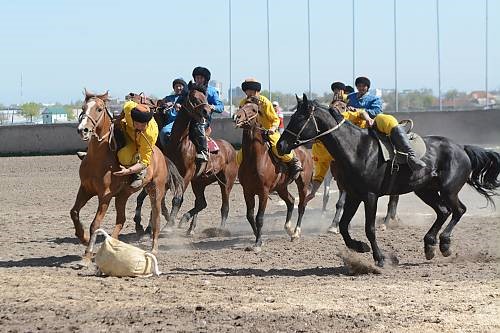
© National Kok Boru Federation, Kyrgyzstan, 2016 |
|
|
|
|
| General Information |
Kok boru is a traditional horse game inscribed on the Representative List of the Intangible Cultural Heritage of Humanity by Kyrgyzstan. The game is also popular in Kazakhstan, Uzbekistan, Turkey, Afghanistan, Tajikistan and Mongolia under a variation of names: buzkashi, kokpar, kupkari, ulak tartysh, kökbörü, gökbörü, etc. It comprises of traditional practices, performances and the game itself. It can be seen as a combination of horse racing and other horse games. Two teams on horseback, each consisting of 12 players have to try and get hold of a goat’s carcass (replaced with a mould in modern-day games) or ‘ulak’, and score by putting it into the opponents’ goal or ‘tai kazan’. Four players from each team are on the field at a time (World Nomad Games Competition Rules 2018).The most experienced players serve as referees, next to that there are also the ‘kalystar’ (elders), who ensure the fairness of the game. Kok boru as a cultural and historical tradition serves to unite communities regardless of social status, fostering a culture of teamwork, responsibility and respect (UNESCO, n.d.). It is a reminder of a nomadic past. |
| History/Development |
The Kyrgyz people used to hunt wolfs who formed a thread to their livestock. Most likely the game found its origin in informal competitions among shepherds guarding their flocks. “Kok boru” means grey wolf in Kyrgyz (World Nomad Games Competition Rules 2018). |
Transmission
(Policies/institutions) |
The community of bearers includes professional players, semi-professional and amateur teams, as well as the general public (UNESCO, n.d.).Knowledge related to the element is primarily transmitted naturally by means of demonstration, as well as during festive and social events. The community concerned is actively involved in ensuring its viability through the transmission of knowledge and skills, research and the organization of training. The National Kok Boru Federation, established in 1998, plays a key role in promoting and safeguarding the element through development and organization of activities (UNESCO, n.d.). |
| Relevant Organisations |
- World Nomad Games
- National Kok Boru Federation of the Kyrgyz Republic |
| Additional Materials |
|
| References |
- UNESCO, (n.d.). Kok Boru, Traditional Horse Game. [online] Ich.unesco.org. Available at:
https://ich.unesco.org/en/RL/kok-boru-traditional-horse-game-01294> [Accessed 1 April 2020].
- World Nomad Games Competition Rules of Kok Boru. (2018).
http://worldnomadgames.com/media/images/2018/04/03/8-kok-boru-rules-en.pdf | | |

